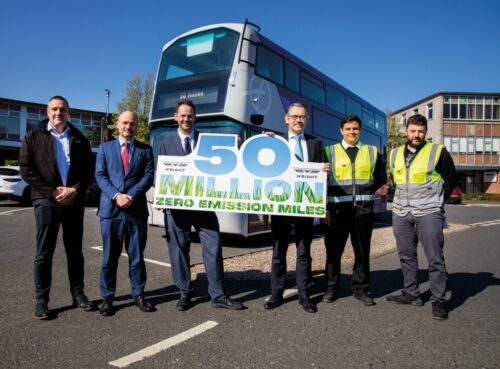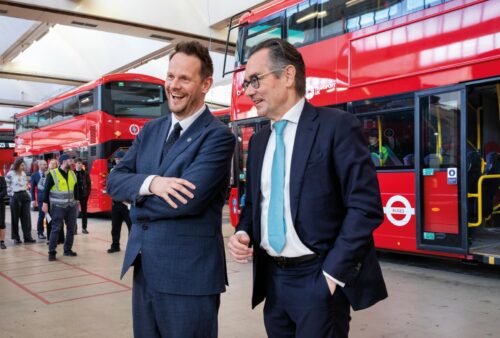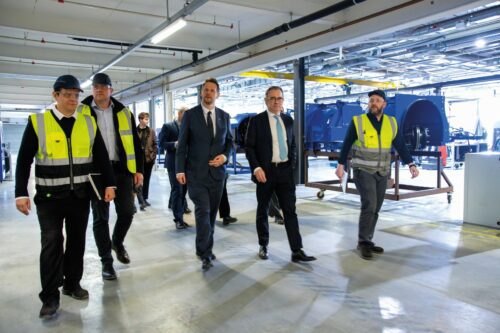
Local Transport Minister Simon Lightwood visited Wrightbus to celebrate the milestone, and spoke exclusively to CBW following a factory tour
Wrightbus celebrated hitting a combined total of 50 million zero-emission miles with a visit from Local Transport Minister Simon Lightwood MP to its Ballymena factory.
The manufacturer believes that the landmark milestone means that its fleet of 1,800 zero-emission buses have prevented some 85,000 tonnes of CO˜ from entering the atmosphere. As part of the visit, Parliamentary Under-Secretary of State for Local Transport Mr Lightwood toured the factory to see how the zero-emission buses are made and to hear about the growth that Wrightbus has undergone in the past few years; the firm is set to produce a record number of 1,200 buses this year – over 95% which will be zero-emission.
Mr Lightwood also heard how Wrightbus currently supports supply chain partners in 47 UK counties and locations across Europe including France, Belgium, Germany, Turkey the Netherlands and the Republic of Ireland. Wrightbus CEO Jean-Marc Gales said: “We were delighted to show Mr Lightwood around the factory and to showcase the important work we’re doing here towards the UK’s net zero targets. To have reached 50 million zero-emission miles is hugely significant, not only in terms of the part we’re playing in helping to decarbonise the public transport sector, but also in terms of the fantastic growth that we’ve undergone over the last five years.
“At Wrightbus, we’re bucking the current downwards trend that is currently happening across the UK’s manufacturing sector and that achievement is significant. It’s important not to forget that as a business, we employed just 56 people in 2019. That number now totals more than 2,300 and that will rise to 2,500 in the next 9 months. We will also support more than 7,500 jobs in the UK supply chain by the end of this year.”
A measure is included in the Government’s incoming Bus Services Bill to end the use of new diesel buses on English bus services, and it recently hosted the first cross-industry bus manufacturing panel to help steer the future of bus production, the first of which was attended by Jean-Marc and took place on 13 March.
Speaking during his tour of the factory, the Minister said: “Wrightbus reaching this phenomenal milestone shows local authorities and operators are driving down emissions and supporting new jobs. Cleaner, greener buses will support 2,000 jobs here in Ballymena, as we continue to drive growth in the industries of the future.”
During his visit, buses on the production line included a batch for Northern Ireland’s Translink. Translink’s Service Operations Director Ian Campbell said: “Public transport is leading the charge when it comes to decarbonisation and we’ve worked closely with Wrightbus in bringing more and more zero emission vehicles to our streets. The 50 million miles landmark is something to be celebrated and we’re delighted that Simon Lightwood MP has recognised this on his visit to Northern Ireland.”

(left) with Wrightbus CEO Jean-Marc Gales. DfT
Exclusive interview
Speaking exclusively to CBW, the Minister said: “It’s a beautiful day here, and I’ve had a fantastic tour around the factory. It’s really impressive. The great thing is seeing that it’s full to capacity. Everywhere is buzzing. And Wrightbus doing well here is good for growth across the United Kingdom.
“I was speaking to Jean-Marc about the apprenticeship scheme, which is fantastic, training and developing young people in some highly skilled jobs, especially when it comes to zero-emission buses.”
Asked whether the current high volume of orders might lead to a downturn in the future, once the large fleets have switched to zero-emission vehicles, the Minister said: “I chaired the first bus manufacturing panel recently, and that was about bringing together bus manufacturers, operators and metro mayors to ask what the future looks like, what the supply chain looks like, and how we can create that smooth pipeline of orders so we can maximise the possibility for growth for UK manufacturers. There was lots of positivity and we’re continuing those conversations. There’s a real commitment from Government that we continue to invest and grow our manufacturing sector when it comes to buses and deliver the skilled, well-paid jobs that come with that.”
Moving away from the big operators and metro mayors, once the ‘low hanging fruit’ is gone, how do we support smaller companies and those whose depots aren’t easy to electrify, I asked. “It’s not an easy thing to do but there’s a sound commitment from the Government to work through that. It’s about not working in a silo. The DfT will work with colleagues in energy and business to see how we can make sure there’s capacity in the grid, how we can make sure we bring through those skills.
“With the Bus Services Bill, we know there’s not a one size fits all solution,” he continued, pointing
to the ability of local authorities to choose how they move forwards, such as via franchising or enhanced partnerships, towards zero emissions. “It’s up to local leaders how they choose to move forward, whether that’s with electric or hydrogen.
Is there a danger of throwing the baby out with the bathwater in a rush to zero emissions, in that we forget that Euro VI is already much cleaner than multiple cars making the same trip? “I want to see that people have a pleasant proposition when it comes to public transport,” the Minister continued. “You do find that electric vehicles are an incredible passenger experience. They’re much smoother and quieter. I want to see us decarbonise public transport as a whole, so I want to see more electric and hydrogen buses.”

What about the infrastructure that buses run on? How do we make sure the new zero-carbon fleet can move better through our towns and cities? “It’s about ensuring that those decisions are devolved down to local leaders as they’re best placed to make those decisions. They understand where the pinch points are, and are thinking about transport as a whole; how can the bus link with other transport? It’s about having a really clear picture of local transport needs.”
Responding to the question of whether the transfer of power to local authorities could lead to a loss of experienced, skilled managerial staff in the industry, he continued: “I’d point you towards places like Manchester where the successful roll-out is working with existing commercial operators to achieve franchising. The commercial operators are delivering, with oversight from Transport for Greater Manchester. We’re retaining that knowledge, whilst local leaders have the control to help guide transport investment and planning in their localities.”
It’s not just in bus that things are changing, but on the railways too. “The Government has been doing a lot of consultation on the national transport strategy,” the Minister said. “It’s really important to have a strategy. We need to make sure everything is joined up, and that with the passenger right at the centre we deliver services for the future. I think we have a once in a generation opportunity here to put the passenger right at the centre of our bus and rail services.”

